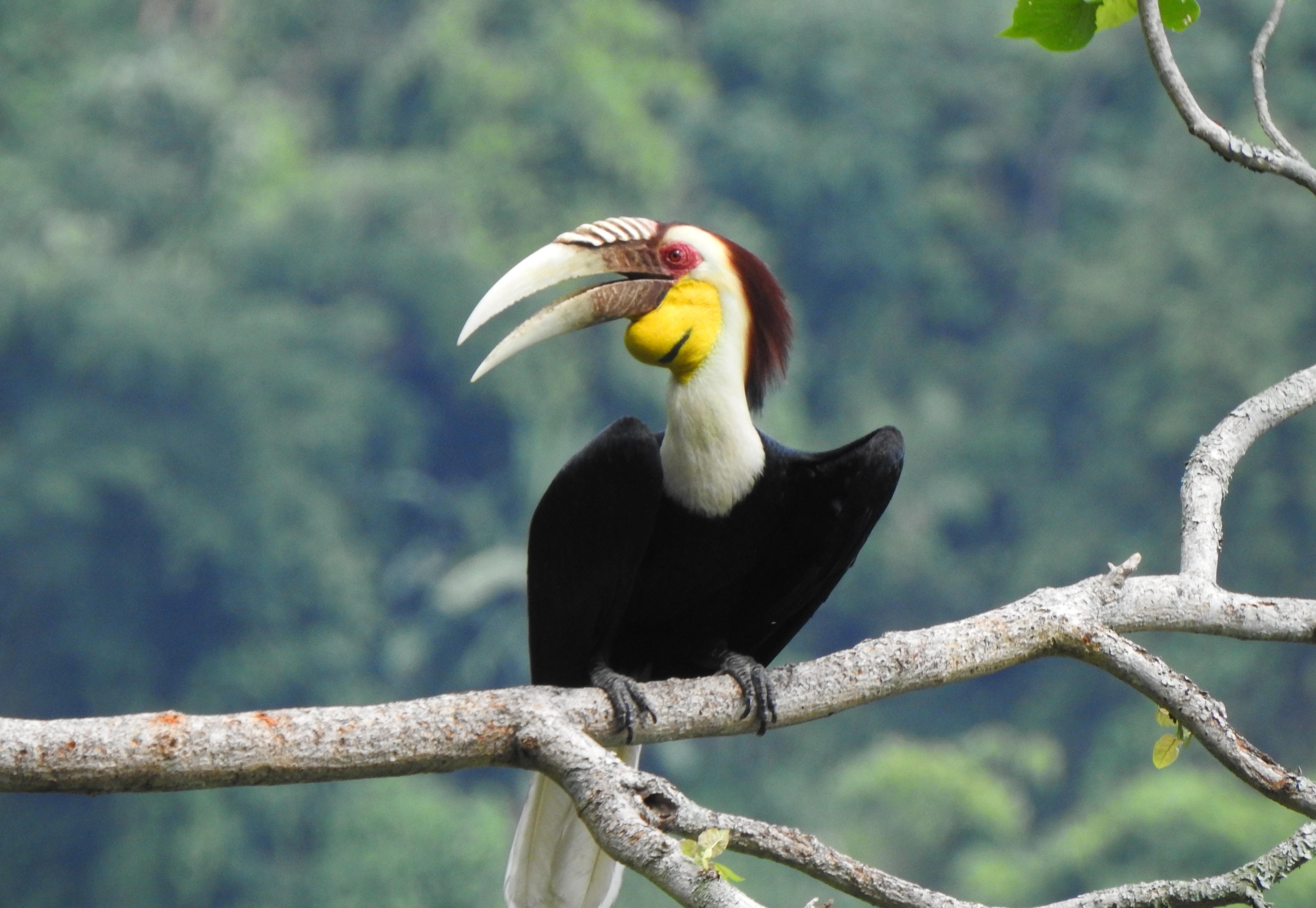#30年未见的棕颈犀鸟现身 #
Located on the border between China and Myanmar, the Chinese Hornbill Valley in Yingjiang County, Yunnan Province, is a paradise for flora and fauna, with many precious birds living here. Hornbills, red-legged falcons, and gray peacocks have attracted the attention of many bird lovers.

Corolla crumpled helmet hornbill South Spring Cetin photo
Recently, there was good news from Yingjiang, when several ecological photographers took precious images of brown-necked hornbills in the mountains and forests of Yingjiang County, Dehong Dai Jingpo Autonomous Prefecture, Yunnan Province, at an altitude of more than 2,000 meters.
On March 7, Zeng Xiangle was photographed in the Hornbill Valley of Yingjiang
The brown-necked hornbillon, whose scientific name is Aeros nipalensis, is a large bird. The male has long orange shawl-length hair and feathers that extend to the chest, like a mink worn by a casino tycoon. Coupled with bright blue eyelids and a huge curved mouth, it looks like the fierce appearance of the Golden Retriever King in the forest.
The female has no orange crown feathers, has black hair, and the bright blue color of the throat is more pronounced.
Compared to other hornbills that inhabit the rainforest, the brown-necked hornbill prefers mountain forests and lives in evergreen forests above 1500 meters above sea level.
Brown-necked hornbills left females and right males huangyan.riyuexia.com
images of < h1 class= "pgc-h-arrow-right" > 5 species of hornbill We have now gathered four species</h1>
Yingjiang County currently has a recorded number of bird species of 710 species. The double-horned hornbill, the corolla creased hornbill and the crowned hornbill all have stable observation records in Yingjiang County, and with the brown-necked hornbill recorded this time, only the white-throated hornbill is left to be discovered and examined among the recorded hornbills in China.
White-throated hornbills museum.ioz.ac.cn
If you go to the Chinese Hornbill Valley in Yingjiang, Yunnan Province, this season, you have the opportunity to see the precious pictures of hornbill couples courting, mating and nesting.
<h1 class="pgc-h-arrow-right" > a model of my generation, the super daddy of Kanaya Zojiao</h1>
As a rare bird, the hornbill is also a model of responsibility for the family.
After mating, the hornbills will choose a tall tree hole that natural enemies cannot climb up as a nursery, where they will lay the crystallization of love, the egg.
When the female hornbill enters the tree hole, she will first seal the hole with the dirt provided by the male bird and her own feces, leaving only a narrow gap.
She will always wait in the hole for the young birds to break out of their shells, and after 90 days, the young birds will be full of wings, and then break out of the nest with the children.
During this period, the hornbill mother and son eat and drink Lazarus all in the cave, relying on the hornbill father to feed back and forth every day, and take on the responsibility of cleaning up the household garbage.
Mouth berries returned from the corolla wrinkle helmet hornbill daddy Nanchun citine photo
There is an old saying among male hornbills: "No matter how bitter you are, you can't suffer your wife and children."
In order to improve feeding efficiency, male hornbills will store a lot of fruit in the sac (that is, the yellow bulging part in the photo), return to the mouth of the hole and then regurgitate it out of the sac one by one and feed it to the female and young birds.
< h1 class= "pgc-h-arrow-right" > discover the significance of new species of hornbills</h1>
For ornithologists, the brown-necked hornbillon is a mysterious bird that has been around for the last century. The last record in Yunnan was an ancient photograph taken by photographers in Xishuangbanna in the 1980s. This discovery, after several decades, confirmed the fact that the brown-necked hornbill is distributed in Yunnan. Scientists know the specific direction of their activities, and they can further understand their population numbers and habits, so as to better protect these beautiful creatures.
Forests where hornbills are distributed, which are themselves in protected areas, will receive special attention from now on. Other species that live in it have also gained stable habitats by protecting the light of the hornbills.